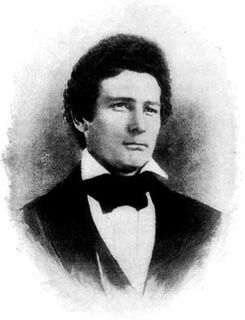
Pedro Hermión of Jefferson.
Pedro Hermión (1811 - 1851) was the third President of the United States of Mexico, serving from September 1845 to June 1851. He was the founder of the Hermión family and was the first Mexican President to be assassinated.
Political Career[]
Hermión's father died fighting under General Carlos Mejía at the Battle of Seven Forks. Hermión himself grew up in Lafayette, Jefferson, part of that city's growing Hispano minority. He entered public affairs at a young age, earning a reputation as a hard-working politician. He was elected to the Assembly in 1841 as a Continentalist.
Hermión first came to national prominence on 7 May 1843, during the Continentalist Party's convention in Henrytown, Jefferson. There he gave his famous Scorpions in a Bottle speech, predicting war with the Confederation of North America. Hermión became the leader of the Continentalist Party, winning a Senate seat the following year. From his office in Mexico City, he beganning planning his race against incumbent President Miguel Huddleston. During the 1845 Mexican elections, Hermión spoke of "the coming struggle for the continent," while the Continentalists asked Mexicans to "be true to the memory of Jackson." This rhetoric, along with news of fighting between Mexican and North American settlers in the disputed Broken Arrow region, allowed the Continentalists to regain control of the Congress in August. The newly-elected Senate met on 5 September, and chose Hermión as the new President.
Presidency and Assassination[]
In his inaugural speech the next day, Hermión said, "We do not want war with any nation, but we do not shrink from action when it is necessary. We know what is ours, and we mean to keep it." He ordered negotiations with the C.N.A. to continue, and sent a message to Governor-General Winfield Scott assuring him that he would continue the search for peace "in the spirit of my predecessor." However, attempts at a peaceful resolution of the crisis failed.
The Rocky Mountain War began on 4 September 1845, the day before Hermión was voted into office, when the armed forces of the two nations clashed in the disputed area. When news of the fighting reached Mexico City, Hermión claimed that Mexico had been invaded "in the night, in secret, by men who dare not face us in the open." Hermión conducted a defensive campaign, turning back North American assaults on Mexico City, Jefferson, Mexico del Norte, and California, but launching no attacks on the C.N.A. Unlike Scott and his successor Henry Gilpin, Hermión was content to give his military commanders a free hand.
Public opinion turned against Hermión and the war when news arrived of the terrible losses suffered during the Battle of Williams Pass. There were several assassination attempts made against Hermión in the spring of 1851. On 19 June Hermión appeared before Congress to deliver a special message, in which he defended the war and vowed to march on Burgoyne and personally dictate peace terms to Gilpin. Immediately after the address, Hermión was assassinated by a former member of the Presidential Guard named Emiliano Zangora. Zangora in turn was killed by the Congressional guard.
A Hermión craze swept the U.S.M. following the assassination, and the nation plunged into mourning. A group of his supporters petitioned the Pope to beatify Hermión in preparation for his canonization, and towns were renamed for Hermión in France, the Netherlands, and Russia. In 1859 two men named Cabral Fernandez and José Torres claimed to be his illegitimate sons.
A Congressional commission, the Fuentes Commission, was established to investigate Hermión's assassination. In their report, released in 1852, the Fuentes Commission cleared former President Huddleston of any involvement, and concluded that Zangora had been acting alone.
Pedro Hermión's younger son Benito Hermión would become Chief of State of the U.S.M. in 1881, and his older son Victoriano Hermión would become President of New Granada in 1890.
Members of Hermión's cabinet included Secretary of State Raphael Blaine and Secretary of War Yves St. Just.
Sobel's sources for the life of Pedro Hermión include James Boatwright's Pedro Hermión: A Hero in His Own Land (Mexico City, 1954), Janet Holt's Demagogue and Dictator: The Life of Pedro Hermión (New York, 1954), Herman Muller's Hermión of Jefferson: Patriot or Traitor? (Mexico City, 1969), and John Conroy's The Rhetoric of Pedro Hermión: A Study in Mob Psychology (London, 1970).
Given that the surname "Hermión" is not Hispanic, and in fact is not a surname in any culture, the FAN Cabal speculated that it was given to Pedro Hermión's immigrant father in place of his original unpronounceable Greek surname, due to his arriving on board a ship named Hermione. Pedro Hermión appears in the For All Nails vignette Santa Anna's Coming to Town.
| Heads of State of the U.S.M. |
|---|
| Andrew Jackson • Miguel Huddleston • Pedro Hermión • Raphael Blaine • Hector Niles • Arthur Conroy • Omar Kinkaid • George Vining • Benito Hermión • Martin Cole • Anthony Flores • Victoriano Consalus • Emiliano Calles • Pedro Fuentes • Alvin Silva • Felix Garcia • Vincent Mercator • Raphael Dominguez |
'
'
'
